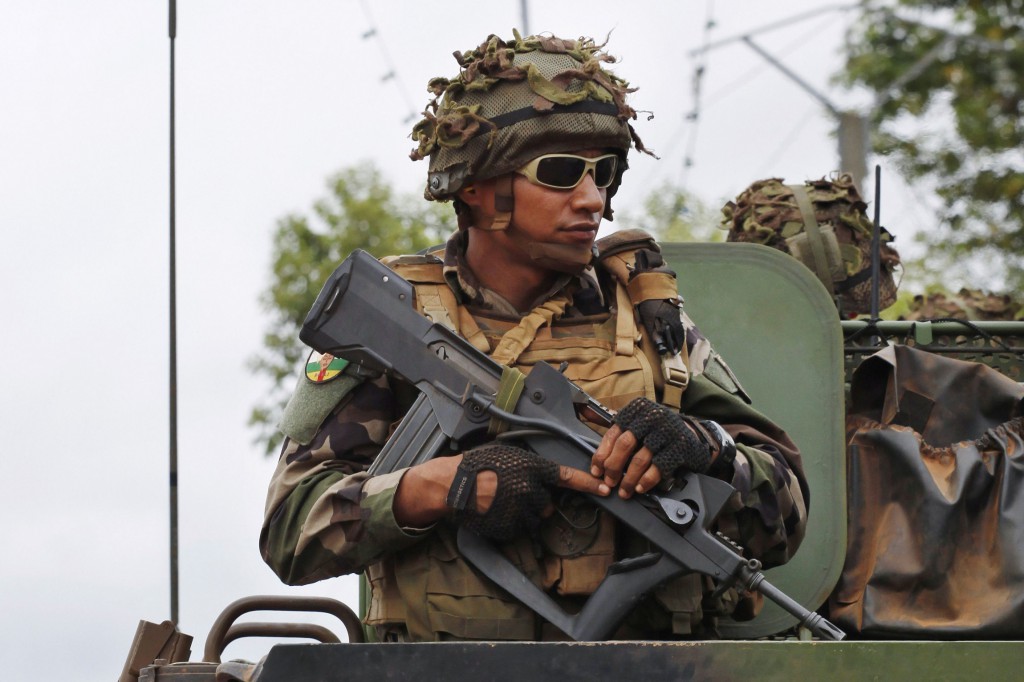
By Jonathan Luxmoore
Church leaders in the Central African Republic are hoping the arrival of French and African troops will help settle a situation that has effectively left people barricaded in their homes in the capital, Bangui.
“It’s tense and dangerous on the streets and everyone is afraid,” said Msgr. Cyriaque Gbate Doumalo, secretary-general of the Catholic bishops’ conference.
“We’ve long appealed for the international community to intervene, since no one here can do anything. We hope the new forces will now act quickly to bring this crisis to an end,” he told Catholic News Service by phone Dec. 5.
Msgr. Doumalo said he had been unable to leave his residence because of “constant shooting everywhere,” and said local radio stations, deprived of staff, were playing music rather than broadcasting news.
He said St. Bernard Parish in the northern part of Bangui had appealed for help after refugees from the fighting, some with gunshot wounds, sought shelter in the church.
“The roads are all blocked and there’s no movement in the city, so we can do nothing,” Msgr. Doumalo said. “We need the international community to do something as soon as possible to separate the two sides and restore peace and hope.”
The priest spoke to CNS just hours before the U.N. Security Council authorized French and African troops as peacekeepers in the country.
As the vote on the authorization approached, international media reported the increase in fighting in Bangui. Agence France-Presse reported at least 16 people were killed in fighting Dec. 5, after Bangui was attacked in the early hours by supporters of former President Francois Bozize, whose ouster by rebels in March plunged the Central African Republic into chaos.
East of Bangui, Bishop Juan Aguirre Munoz of Bangassou said the presence of French and African reinforcements was already “being felt” in his diocese, with rebel soldiers “on the run” in some areas.
However, he added that Catholic missions in Bangassou and Bouca were still sheltering tens of thousands of displaced people, many of whom lacked food and medicine, and said a group of Christians and Muslims were working together to “promote peace and reconciliation through forgiveness.”
“The situation in Central Africa is different according to where you are,” Bishop Aguirre told Fides, the Vatican’s missionary news agency, Dec. 3.
“Sectarian tensions are strongest in the north, but with the deployment of French and African troops, I think we’ll be able to avoid interfaith collision,” he said.
The Catholic church’s nine dioceses make up around a third of the 4.4 million inhabitants of the Central African Republic, one of the world’s poorest countries, with Muslims comprising around a tenth.
The United Nations says one in 10 inhabitants fled their homes and a quarter were left in need of food, after Seleka, a rebel coalition of mostly foreign mercenaries, ousted Bozize and suspended the constitution. Church leaders say the rebels — not the nation’s Muslims — have been targeting Christians.
In a June statement, the bishops’ conference said Seleka’s occupation had left the country “looted and destroyed” and its “social fabric completely torn up.”
However, Msgr. Doumalo told CNS he was confident the planned French deployment, with a U.N. mandate to “take all necessary measures” to assist an African force of 3,600 troops, would quickly change the situation.
“A large part of our population, adults and children, is now displaced and terrified with nowhere left to go,” Msgr. Doumalo told CNS. “The fact that fighting is now centered on Bangui has already created a new situation, and I’m sure these foreign forces can now quite easily restore order.” – CNS